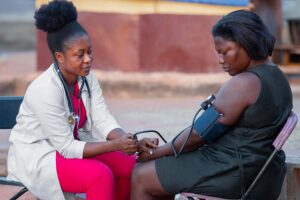Plasma donation is an act of compassion, offering a chance to save lives and improve health, especially for those suffering from conditions like hemophilia, burns, or cancer. However, before you decide to donate, it’s essential to know how to sell your plasma safely. Whether you’re considering selling your plasma or simply want to donate for a noble cause, following the correct steps is crucial to ensuring your health is protected. In this guide, we’ll walk you through the process of selling plasma safely in Nigeria, what to expect, and how to get started.
Why Donate Plasma? Understanding the Importance of Plasma Donation
Plasma is the yellowish liquid component of blood that carries water, salts, and enzymes. It also contains important proteins like clotting factors, albumin, and immunoglobulins. Plasma plays a vital role in various medical treatments, including blood transfusions and therapies for immune deficiencies.
Many people in need rely on blood plasma donation centers, as plasma is crucial for life-saving treatments, especially for individuals who have suffered severe blood loss, burns, or need ongoing medical therapies. Giving plasma regularly can also improve your health by stimulating your immune system, potentially leading to better overall wellness. However, it’s important to understand the steps to sell your plasma safely, as doing it incorrectly can pose risks to your health.
Step 1: Understanding Plasma Donation vs. Blood Donation
Before you make the decision to donate, it’s essential to understand the difference between blood donation and plasma donation. Plasma donation involves separating the plasma from your blood through a process called plasmapheresis, and the red blood cells, white blood cells, and platelets are returned to your body.
Blood donation, on the other hand, involves donating whole blood, which is later separated into its components. If you choose to sell your plasma, you will typically receive compensation for your time, and the plasma will be used for medical purposes, such as for treating burns or clotting disorders.
Step 2: Know Your Blood Group and Rhesus Factor
It is important to know your blood group and rhesus factor (positive or negative) before donating. Certain plasma centers may prefer donors with specific blood types or rhesus factors. In Nigeria, most plasma centers accept individuals with common blood types like O positive and A positive, but some might focus on other groups for specific treatments.
You will be asked about your genotype as well, as it’s essential to ensure compatibility for plasma donation and to avoid complications. If you’re unsure about your blood type, get tested at a reliable clinic or plasma center.
Step 3: Find a Reputable Plasma Donation Center
To sell your plasma, finding a reputable plasma donation center is key. In Nigeria, facilities like Oneus provide a safe and hygienic environment for plasma donation. Before you sell plasma, ensure the center is licensed and follows all medical standards to protect your health.
Look for plasma centers that:
-
Are certified and regulated by the appropriate health authorities.
-
Have experienced staff trained in safe plasma collection procedures.
-
Maintain high hygiene standards to prevent infection and complications.
Step 4: Health Screening
Before donating plasma, a health screening is mandatory. During this screening, you’ll undergo a physical examination and may be asked questions about your medical history. You’ll also need to provide your blood type and information about your genotype and rhesus factor. This step is crucial for ensuring that donating plasma will not put your health at risk.
Additionally, you will undergo a blood test to check for any infections like HIV, Hepatitis B, and Hepatitis C, as these could affect your eligibility to donate. If you pass this screening, you can proceed to donate.
Step 5: The Plasma Donation Process
Once cleared, you can proceed with the donation. The process typically involves:
-
Sitting comfortably in a reclined chair while the plasma donation is being performed.
-
A needle being inserted into your arm to collect the plasma. This takes about 45 minutes to an hour.
-
After the plasma is collected, the other components of your blood (red blood cells, white blood cells, platelets) are returned to your body.
Step 6: Post-Donation Care
After donating, you’ll be monitored for any adverse reactions. It’s common to feel a little lightheaded, so it’s best to stay at the plasma center for a short period until you’re feeling normal. Drink plenty of water, and avoid heavy physical activity for the rest of the day.
Make sure to eat well before your donation and follow the center’s post-donation instructions. Staying hydrated is crucial for maintaining your blood volume and health after donating.
Step 7: Why Compliance is Important
Not following safety protocols when donating plasma can put your health at risk. Plasma donation is a regulated procedure, and not adhering to medical guidelines can lead to complications such as fainting, infection, or dehydration. In severe cases, repeated unsafe plasma donations could affect your long-term health.
Also, selling plasma in an unregulated environment could lead to exploitation. Therefore, ensure you donate or sell plasma only at certified plasma donation centers that uphold the highest standards.
Conclusion: Give Blood, Save a Life
Selling plasma is a noble act that can make a significant difference in someone’s life. By donating, you contribute to blood donation drives, helping hospitals treat patients suffering from severe medical conditions. Remember, your health should always come first. That’s why it’s essential to donate only at trustworthy centers that prioritize your safety.
Call to Action
Give Blood, Save a Life – Book Your Donation Now! Contact us at info@oneusng.com or call +234 902 168 2822 to learn more about how you can donate plasma safely. Visit Oneus Nigeria today and take action to make a life-saving difference.
By following these steps, you can safely and effectively donate plasma, contributing to life-saving treatments for those in need while protecting your own health.




